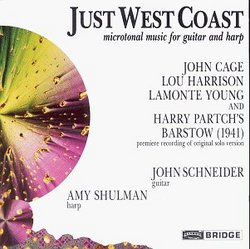| All Artists: John Cage, Lou Harrison, Harry Partch, La Monte Young, guitars John Schneider, harps Amy Shulman Title: Just West Coast Members Wishing: 2 Total Copies: 0 Label: Bridge Release Date: 11/1/1993 Genres: Dance & Electronic, Pop, Classical Styles: Vocal Pop, Chamber Music, Forms & Genres, Short Forms, Historical Periods, Classical (c.1770-1830), Instruments, Keyboard Number of Discs: 1 SwapaCD Credits: 1 UPC: 090404904127 |
Search - John Cage, Lou Harrison, Harry Partch :: Just West Coast
 | John Cage, Lou Harrison, Harry Partch Just West Coast Genres: Dance & Electronic, Pop, Classical
|
Larger Image |
CD Details |
CD ReviewsLike spring water(just intonation) versus tonality(polluted) Rachel Abbinanti (tusai1@aol.com) | Chicago | 06/27/1999 (5 out of 5 stars) "Just intonation is based on the natural physicalness of sound,that composers and performers . We haven't, in the history of Western music, instead we have been barbarians with Tonality as our ear- icon, the Western system of what we hear(or don't hear) today is based on "bent" or altered states of vibrations, especially the intervals thirds and fifths. The problem now is that our ears have been conditioned,almost irreparably.Tonality is like an oil-slick touching every shore of World music. If you've never heard music based on just intonation, this is a great place to start. The combination harp and guitar (with some percussion here) has a pure unimpaired quality for which you will immediately say, "why haven't I ever heard this music before". The works here are also by devoted creators who have an intimate knowledge of the tuning non-Western systems of the world. Lou Harrison's music works best in smaller intimate pieces as here in the "Suite No.2". Here the tightly constructed five movements for guitar and harp has a richly diverse constitution,highlighting the solos unique melodic qualities as well as the ensemble chordal combinations. Harrison's music has a close association with the gestures of Asian music,but you always sense he is speaking his own voice always melodic yet with original shapes,lines and contours in unpredictable ways. La Monte Young's "Sarabande", originally for piano solo doesn't suffer under its transformation for guitar and harp.It sounds like wind chimes,a sense of static harmonies(purified now) drifting freely and gently. I never warmed to Partch's music. Granted his profound theories on tuning and instrument making is what the world music systems needed, still his music doesn't have the emotive eqivalence of his profound theories. The spoken text here from "Barstow: 8 Hitchhikers' Inscriptions"(1941) is simply blunt and boring reflecting an uniformed sense of the unfreedom of anarchy. "In a Landscape" by John Cage,- originally a piano piece- works better, as a harp solo with its simple arpeggiated harmonies magnetized around two tones." Dream" also by Cage works less successfully, the original G-minor piano solo has a sense of sparceness,and intimacy, where the guitar and harp combination heregently explodes thisas a miniature orchestration. Shulman and Schneider are always sensitive with a high sense of musicality and emotive direction no matter what music is in front of them." Excellent selection Marcus_Speh@Yahoo.Com | London, UK | 03/26/1999 (4 out of 5 stars) "A beautiful selection of microtonal pieces. I enjoyed listening to it a lot. The booklet which comes with the CD is great and manages to explain some of the concepts behind this music. Great value."
|

 Track Listings (24) - Disc #1
Track Listings (24) - Disc #1